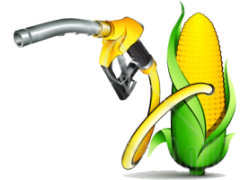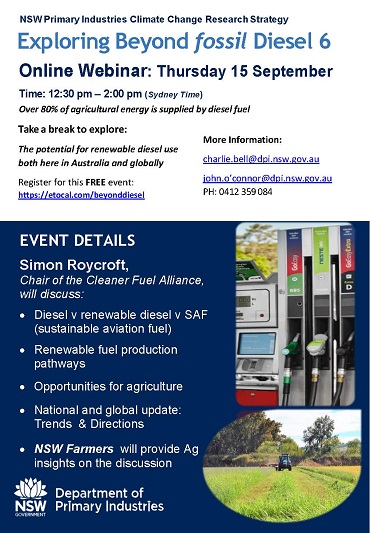Biodiesel, renewable diesel and bioethanol
Biodiesel and renewable diesel
Diesel made from fossil fuels is the primary source of energy on many farms, fuelling tractors, other vehicles, pumps, machinery and remote electricity generators. Displacing diesel with biodiesel or renewable diesel has the advantages of reducing farmers’ exposure to oil price volatility and potential supply disruptions, and also reduces emissions. In addition, there is the potential for farmers to grow their own fuel to run farm machinery or generate an income stream by selling feedstocks for biofuel production.
Biodiesel is currently a lot more prevalent than renewable diesel but has limitations in its use. It is produced from vegetable oils and waste fats. Any diesel engine can potentially run on a conventional biofuel blend and the Australian diesel fuel standard allows up to 5% biodiesel in pump fuel. Higher concentrations of conventional biodiesel can cause issues with current infrastructure and engines.
Renewable diesel is an advanced biofuel that is synthetically refined so it meets the fuel quality standard and therefore can be used as a direct replacement for petroleum diesel without the need to blend it with petroleum diesel. Renewable diesel is produced from a wider variety of feedstocks than conventional biodiesel including non-food biomass and feedstock such as straw, cotton trash and urban waste streams. It can also use purpose-grown crops such as grass, woody biomass or algae. Renewable diesel is compatible with existing infrastructure and vehicles, but commercial scale production has yet to occur in Australia, though some pilot scale plants are in operation.
For more information about biodiesel and renewable diesel see the Diesel use in NSW agriculture and opportunities to support net zero emissions report (PDF, 1741.56 KB)
The May-June 2022 edition of NSW Farmers 'The Farmer' magazine contains a discussion of alternatives to diesel, including biodiesel and renewable diesel. Turn to page 36 to view the article, 'Can diesel fuel farming forever?'
Free Webinar
Click here to find out more about DPIRD Energy team's latest webinar in the Exploring Beyond Diesel series on 15 September 2022 where Simon Roycroft, Chair of the Cleaner Fuel Alliance, will discuss diesel vs renewable diesel vs Sustainable Aviation Fuel and other future opportunities for renewable diesel use both here in Australia and globabally.
Register online at Tocal College website
Join the webinar on 15 September via Zoom
Bioethanol
Bioethanol is produced from starch crops, such as corn or wheat, and sugar crops, such as sugar cane and sugar beet, and is primarily a replacement for petrol. In Australia bioethanol is mainly produced using feedstock from the sugar industry and a blend of unleaded petrol and up to 10% ethanol, E10, is available. A fuel which contains up to 85% ethanol, E85, is also available in Australia, but is generally only suitable for purpose-built vehicles. Bioethanol is used extensively in Brazil, USA and the EU.
